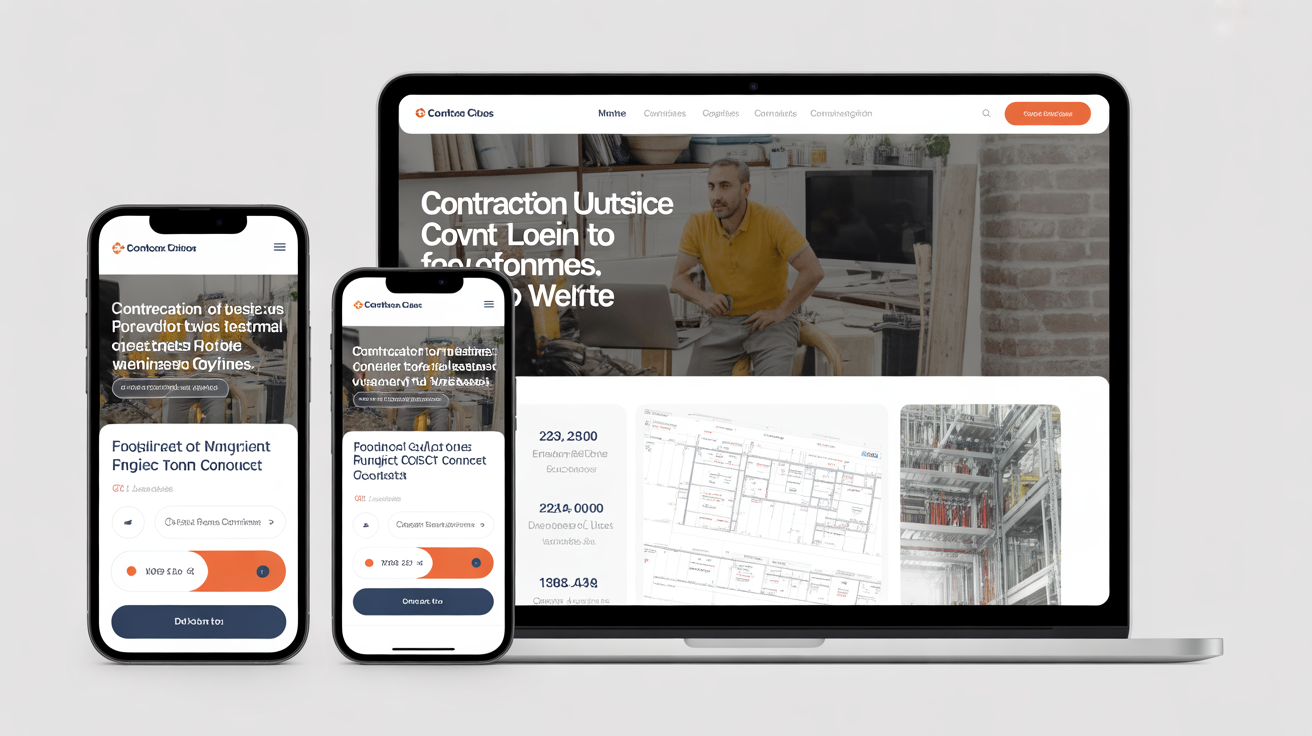Contractor Website Design: SEO Best Practices for Construction Companies
Your Website Is Your Digital Job Site (And Most Are a Mess)
Here's the uncomfortable truth: your website is often the first job site potential customers visit, and if it looks like a disaster zone, they're not going to trust you with their construction projects.
I've seen contractors who build million-dollar projects with websites that look like they were thrown together in someone's garage. Meanwhile, their competitors with inferior construction skills are landing the projects because their websites make them look more professional and trustworthy.
I'm Mike from Purple Wave Creative, and I've been helping contractors build websites that actually generate leads and showcase their expertise properly. The construction companies that dominate their markets don't just have great websites - they have strategically designed websites that work as hard as they do to bring in qualified customers.
Your website isn't just a digital brochure. It's your 24/7 salesperson, your project portfolio, your credibility builder, and your lead generation machine all rolled into one. But only if it's designed and optimized correctly.
This isn't generic web design advice adapted for contractors. This is a specific blueprint for construction companies who understand that your website needs to work as professionally as your construction projects.
Why Most Contractor Websites Fail to Generate Leads
The Common Contractor Website Mistakes
Generic Template Syndrome: Using the same WordPress template as hundreds of other contractors, with stock photos of people in hard hats that look nothing like your actual team or projects.
Project Portfolio Disasters: Blurry photos taken with phones, no project details or context, and before/after shots that don't showcase the quality of your work effectively.
Mobile Disasters: Websites that don't work on phones and tablets, even though 68% of contractor searches happen on mobile devices.
Contact Information Confusion: Making it difficult for customers to find your phone number, service areas, or how to request estimates.
Trust Signal Failures: Missing or hidden licensing information, insurance details, certifications, and customer testimonials that prove you're a legitimate, professional contractor.
Why These Mistakes Cost You Projects
First Impression Reality: You have 3 seconds to make a good impression online. If your website looks unprofessional, potential customers assume your construction work is unprofessional too.
Mobile Usage Dominance: Emergency contractor searches happen on phones. If your website doesn't work on mobile, emergency customers can't find or contact you when they need help most.
Trust Factor Critical: Construction projects involve significant investments and home access. Customers need confidence in your professionalism before they'll even call for estimates.
Local Competition: While you're losing leads to poor website design, your competitors with professional websites are capturing the customers who should be choosing you.
The Contractor Website Success Formula
Professional Design + SEO Optimization + Lead Generation Focus + Mobile Performance = Websites That Generate Qualified Leads
Your website needs to look as professional as your best construction project, work perfectly on all devices, show up in search results when customers need contractors, and make it easy for qualified customers to contact you.
Want to see examples of contractor websites that are generating consistent leads and showcasing expertise effectively? Follow our Instagram where we share before/after website transformations and real results from construction companies.
SEO-First Website Architecture for Contractors
Just like construction projects need solid foundations and logical blueprints, contractor websites need SEO-optimized architecture that helps customers find what they need and search engines understand your expertise.
Homepage Foundation Strategy
Above-the-Fold Essentials:
Clear value proposition: "Professional [Your Specialty] Contractor Serving [Service Area]"
Prominent phone number with click-to-call functionality
Professional hero image showing your team or best project
Primary call-to-action: "Request Free Estimate" or "Schedule Consultation"
Trust Building Elements:
Years in business and local community service
Licensing, insurance, and bonding information
Professional certifications and industry memberships
Customer testimonials and review highlights
Navigation Structure:
Services (with dropdown for specific contractor services)
Projects/Portfolio (organized by project type)
About Us (team, history, credentials)
Service Areas (geographic coverage)
Contact/Estimates (multiple contact methods)
Service Page Architecture
Individual Service Optimization: Each major service needs its own optimized page:
HVAC installation and repair
Electrical services and upgrades
General contracting and construction
Specialty services (emergency response, commercial work)
Service Page Elements:
Clear service description and process explanation
Before/after project examples for that specific service
Service area coverage and availability
Pricing information (even if general ranges)
Specific call-to-action for that service type
Local Service Integration:
Service + location pages: "HVAC Services in [City Name]"
Service area maps and coverage information
Local project examples and community involvement
Response time commitments for different areas
Project Portfolio Architecture
Portfolio Organization Strategy:
Residential projects (by room type or project scope)
Commercial projects (by business type or project size)
Specialty projects (unique challenges or innovations)
Emergency/repair projects (problem-solving examples)
Individual Project Pages:
High-quality before/after photography
Project scope, timeline, and challenges overcome
Customer testimonials specific to that project
Technical details and materials used
Location (with customer permission) and service area relevance
For advanced website architecture strategies that improve both SEO and lead generation, connect with us on LinkedIn where we share detailed technical SEO approaches for construction companies.
Mobile-First Design for Emergency Contractor Services
Emergency Service Mobile Optimization
Click-to-Call Priority:
Large, prominent phone numbers on every page
Emergency hotline numbers clearly distinguished
Click-to-call buttons that work perfectly on all devices
Multiple contact methods (phone, text, emergency form)
Fast Mobile Loading:
Emergency service pages load in under 2 seconds
Optimized images that don't sacrifice quality
Minimal scripts and plugins that slow performance
Mobile-optimized contact forms and estimate requests
Crisis-Friendly Navigation:
Critical information (phone, service areas, availability) above the fold
Simple, thumb-friendly navigation menu
Emergency service information prominently featured
Clear service area coverage and response time information
Mobile User Experience Design
Touch-Friendly Interface:
Large buttons and clickable elements
Easy-to-tap phone numbers and contact forms
Simplified navigation that works with thumbs
Readable text without zooming
Mobile Content Optimization:
Concise, scannable content that answers questions quickly
Key information presented in easy-to-read formats
Mobile-optimized project galleries and photo displays
Fast-loading testimonials and trust signals
Emergency Contact Optimization
24/7 Availability Features:
After-hours contact information and procedures
Emergency service availability and response times
Clear messaging about emergency service coverage
Multiple ways to reach contractors during emergencies
Crisis Communication Design:
Calm, professional tone that reduces customer stress
Clear safety instructions and immediate action guidance
Emergency service process expectations
Professional expertise and problem-solving focus
Project Portfolio Design That Converts
Portfolio Organization Strategy
Project Categorization:
By service type: Kitchen remodels, bathroom renovations, additions
By project size: Small repairs, major renovations, new construction
By customer type: Residential, commercial, specialty projects
By problem solved: Emergency repairs, upgrades, custom solutions
Visual Storytelling Approach:
Before/during/after progression showing transformation
Multiple angles and detail shots highlighting quality workmanship
Process documentation showing professional project management
Final results with satisfied customers (when possible)
High-Converting Portfolio Elements
Project Detail Pages: Each significant project should include:
Comprehensive before/after photo galleries
Project scope, timeline, and budget range (if appropriate)
Challenges overcome and problem-solving examples
Materials used and quality considerations
Customer testimonial specific to that project
Trust Building Integration:
Customer satisfaction stories and outcomes
Quality control and inspection processes
Professional standards and attention to detail
Follow-up service and warranty information
Portfolio SEO Optimization
Image SEO Strategy:
Descriptive file names: "kitchen-remodel-before-after-cityname.jpg"
Alt text describing project type, location, and outcome
Image compression for fast loading without quality loss
Local project location information (with permission)
Content SEO Integration:
Project descriptions with relevant local keywords
Service type optimization for search engines
Location-based project information for local SEO
Technical project details for expertise demonstration
Connect with other contractors sharing portfolio optimization strategies on our Facebook page where we discuss effective project showcase techniques for the construction industry.
Trust Building and Credibility Design Elements
For contractors, trust building isn't optional - it's essential. Customers are inviting you into their homes and businesses for potentially expensive projects involving safety-critical work.
Essential Credibility Elements
Professional Licensing and Insurance:
Current licensing information clearly displayed
Insurance coverage details and policy information
Bonding capacity for larger projects
Workers' compensation and liability coverage
Industry Certifications:
Professional trade certifications and training
Manufacturer certifications for equipment and materials
Safety training and OSHA compliance records
Continuing education and professional development
Professional Associations:
Better Business Bureau rating and accreditation
Chamber of Commerce membership
Industry association memberships
Professional contractor organization participation
Social Proof Integration
Customer Testimonial Strategy:
Written testimonials with customer names and project details
Video testimonials showing satisfied customers and completed projects
Before/after photos with customer permission and stories
Project outcome documentation and satisfaction metrics
Review Integration:
Google Business Profile reviews prominently displayed
Third-party review platform integration (Angie's List, HomeAdvisor)
Response to reviews showing customer service commitment
Overall rating displays and review trends
Community Involvement Showcase
Local Community Connection:
Community project involvement and charitable work
Local business partnerships and supplier relationships
Sponsorship of community events and sports teams
Years of local service and community investment
Awards and Recognition:
Industry awards and excellence recognition
Customer service awards and satisfaction recognition
Safety awards and incident-free work records
Media coverage and professional recognition
Lead Generation and Conversion Optimization
Converting website visitors into paying customers requires strategic design that guides potential customers through the decision-making process naturally.
Call-to-Action Strategy
Primary CTA Optimization:
"Request Free Estimate" prominently displayed on every page
Contrasting colors that stand out from design elements
Action-oriented language that creates urgency
Multiple CTA placements without overwhelming visitors
Secondary CTA Options:
"Schedule Consultation" for customers wanting to discuss projects
"View Our Work" directing to project portfolio
"Call Now" for immediate contact needs
"Emergency Service" for urgent contractor needs
Contact Form Optimization
Lead Qualification Forms:
Project type selection (helps qualify leads and route inquiries)
Budget range options (helps prioritize follow-up)
Timeline preferences (immediate, planning, future)
Preferred contact method and timing
Form Design Best Practices:
Keep forms short (3-5 fields maximum for initial contact)
Use clear, descriptive field labels
Include privacy policy and contact expectations
Mobile-optimized form design and functionality
Conversion Path Optimization
Visitor Journey Design:
Homepage → Service Pages → Project Portfolio → Contact
Clear navigation that guides visitors through decision process
Related content suggestions and internal linking
Exit-intent popups for visitors about to leave
Trust Building Throughout Journey:
Testimonials and reviews at key decision points
Professional credentials visible on relevant pages
Project examples that match visitor interests
Clear next steps and expectations for contact
Technical SEO Implementation
Technical SEO for contractor websites focuses on local search optimization, mobile performance, and construction industry-specific requirements.
Local SEO Technical Implementation
Local Business Schema Markup:
LocalBusiness structured data with contractor specifications
Service area markup for geographic coverage
Review schema for testimonial and rating display
Professional licensing and certification markup
Google My Business Integration:
Consistent NAP (Name, Address, Phone) across website and GMB
Website and GMB profile synchronization
Review integration and display
Local content and location page optimization
Mobile Technical Optimization
Core Web Vitals Optimization:
Largest Contentful Paint (LCP) under 2.5 seconds
First Input Delay (FID) under 100 milliseconds
Cumulative Layout Shift (CLS) under 0.1
Mobile-first indexing optimization
Performance Optimization:
Image compression and optimization for fast loading
Minimal plugins and scripts that impact performance
Content delivery network (CDN) implementation
Browser caching and compression optimization
Contractor-Specific Technical Elements
Emergency Service Optimization:
Fast-loading emergency service pages
Click-to-call phone number markup
Emergency contact form optimization
After-hours service information structure
Portfolio Technical SEO:
Image optimization for project galleries
Video optimization for project walkthroughs
Case study page structure and optimization
Portfolio category and tag optimization
Content Management and Updates
A successful contractor website requires ongoing content updates and maintenance to stay relevant, maintain SEO performance, and showcase current work.
Regular Content Update Strategy
Project Portfolio Maintenance:
Add new completed projects monthly
Update project descriptions and outcomes
Refresh photo galleries with recent work
Archive outdated or less relevant projects
Blog and Educational Content:
Seasonal contractor advice and tips
Local construction news and regulations
Customer education and DIY guidance
Industry trends and professional insights
SEO Content Optimization
Keyword Integration:
Natural keyword usage in project descriptions
Local keyword optimization for service areas
Long-tail keyword targeting in blog content
Seasonal keyword optimization for contractor services
Content Freshness Signals:
Regular publication of new content
Updates to existing service and location pages
Fresh testimonials and customer reviews
Current industry certifications and credentials
Performance Monitoring and Optimization
Analytics and Reporting:
Google Analytics setup and goal tracking
Lead generation and conversion monitoring
Mobile performance and user experience tracking
Local search performance and ranking monitoring
Continuous Improvement:
A/B testing for conversion optimization
User feedback integration and improvements
Technical performance monitoring and optimization
Competitive analysis and strategy updates
The Purple Wave Creative Website Advantage
At Purple Wave Creative, we understand that contractor websites aren't just about looking professional - they need to generate leads, showcase expertise, and work as your 24/7 marketing partner.
Our Contractor Website Expertise
Construction Industry Specialization: We work specifically with contractors and understand:
Emergency service requirements and mobile-first design
Project portfolio presentation and conversion optimization
Trust building for high-investment construction services
Local SEO optimization for service area domination
Complete Website Strategy: Our approach goes beyond basic web design to include:
SEO-optimized architecture from the ground up
Mobile-first design for emergency and planned services
Lead generation systems and conversion optimization
Ongoing content management and performance optimization
Results-Focused Design: We measure success by what matters to your construction business:
Qualified lead generation and estimate requests
Improved conversion rates and customer acquisition
Local search visibility and market penetration
Long-term website performance and business growth
What Makes Our Contractor Websites Different
Local Market Understanding:
Service area optimization for maximum local impact
Community integration and local business connections
Seasonal contractor needs and capacity planning
Regional construction regulations and requirements
Technical Excellence:
Advanced SEO implementation for contractor needs
Emergency service optimization and mobile performance
Project portfolio design that showcases expertise effectively
Lead generation systems that qualify prospects automatically
Ongoing Partnership:
Regular performance monitoring and optimization
Content updates and SEO maintenance
Training for contractor team website management
Strategic consulting for digital marketing growth
Your Website Success Roadmap
Your contractor website should work as hard as you do to bring in qualified customers and showcase your construction expertise. The contractors who dominate their markets have websites that generate leads while they're focused on delivering quality projects.
Your construction skills and project management expertise are what satisfy customers, but your website is what gets them to choose you in the first place.
Ready to build a website that generates contractor leads? Here's what to read next:
SEO for Construction Companies: The Complete Digital Marketing Guide - Comprehensive SEO strategies that work with professionally designed websites for maximum lead generation.
Contractor Marketing ROI: How to Track Leads and Measure Success - Measuring website performance and optimizing lead generation for maximum construction business growth.
HVAC Contractor Marketing: SEO, Social Media & Lead Generation Strategy - Specialized marketing strategies that integrate with professional website design for HVAC contractors.
Ready to transform your contractor website into a lead generation machine? Let's discuss how professional website design can showcase your construction expertise and generate qualified leads consistently. Schedule your contractor website consultation and let's build a website that works as professionally as your construction projects.










